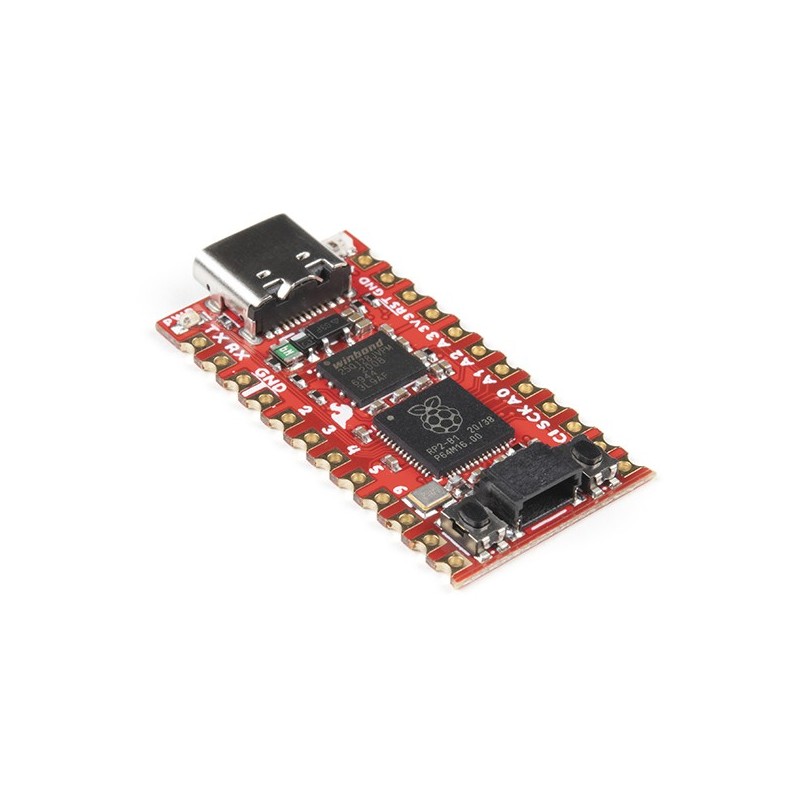- Out-of-Stock





The board with the RP2040 microcontroller equipped with two ARM Cortex-M0 + cores operating at 133 MHz, 256 kB RAM. The board also has 16 MB of QSPI flash memory. The system can be programmed in C/C++ or microPython. SparkFun DEV-17717
SparkFun Pro Micro is a board equipped with the RP2040 microcontroller designed by the Raspberry Pi foundation. The system has two ARM Cortex M0 + cores operating at a frequency of 133 MHz, 256 KB of RAM and 30 GPIO ports. The microcontroller is not equipped with flash memory, but on the board there is an external memory with a capacity of 16 MB connected via the QSPI interface.
On the board, in addition to the RP2040 system and Flash memory, the user will find a 3.3 V voltage stabilizer, Boot and Reset buttons, power and RGB WS2812 LEDs, a USB type C connector for powering and programming the module, and 20 GPIO outputs with such parameters such as four 12-bit ADC inputs, 10 PWM outputs, I2C interface, SPI and two UART interfaces. The I2C bus is also available on the Qwiic connector.
The platform supports the popular MicroPython and C/C++ programming languages. Programs can be loaded to memory via the USB interface using the built-in UF2 bootloader. The guide with examples of use is available on the product page.
Manufacturer BTC Korporacja sp. z o. o. Lwowska 5 05-120 Legionowo Poland sprzedaz@kamami.pl 22 767 36 20
Responsible person BTC Korporacja sp. z o. o. Lwowska 5 05-120 Legionowo Poland sprzedaz@kamami.pl 22 767 36 20
Pin header goldpin black 1x40 pins. Straight connector for through-hole assembly. 2.54mm pitch.
Cable with USB typ A and USB typ C connectors, cable length 1 m. LANBERG CA-USBO-10CC-0010-BK
Cable with USB typ A and USB typ C connectors, cable length 1,8 m. LANBERG CA-USBO-10CC-0018-BK
Module with the RP2040 microcontroller with two ARM Cortex-M0 + cores operating at 133 MHz, 256 kB RAM and 30 GPIO. The board also has 2 MB of external QSPI flash memory. Module can be programmed in C/C++ or microPython. Raspberry Pi Pico
MicroMod main module with RP2040 microcontroller. Equipped with an M.2 connector, it can work with MicroMod expansion boards. SprakFun DEV-17720
The board with the RP2040 microcontroller equipped with two ARM Cortex-M0 + cores, which work at a frequency of 133 MHz, 256 kB RAM. The board also has 16 MB of QSPI flash memory. The system can be programmed in C/C++ or microPython. SparkFun DEV-17745
3-pin ARK mounting strip, 5.0 mm pitch. 301-5.0-03P-12-00A(H)-BC
No product available!
2-pin ARK mounting strip, 5.0 mm pitch. 300R-5.0-02P-12-00A(H)
No product available!
3-pin ARK mounting strip, 5.0 mm pitch. 300R-5.0-03P-12-00A(H)
No product available!
2-pin ARK mounting strip, 5.0 mm pitch. 301R-5.0-02P-14-00A(H)
No product available!
3-pin ARK mounting strip, 5.0 mm pitch. 301R-5.0-03P-12-00A(H)
No product available!
3-pin ARK mounting strip, 5.0 mm pitch. 103-5.0-03P-14-00A(H)
No product available!
2-pin terminal connector with a pitch of 7.5 mm, detachable.
No product available!
2-pin terminal connector with a pitch of 7.5 mm, detachable.
No product available!
3-pin terminal connector with a pitch of 7.5 mm, detachable.
No product available!
Board with the WiFi Espressif ESP32-C3 module. It offers 4 MB of Flash memory and 400 KB of SRAM and an RGB diode. It is equipped with a STEMMA QT connector. Adafruit 5405
No product available!
Black aluminum case for Raspberry Pi 4B minicomputer. Allows for mounting a 3.5 "display. Heatsinks included. Waveshare PI4-CASE-LCD-3.5
No product available!
Base board dedicated to Raspberry Pi CM4 modules. It is equipped with connectors compatible with Arduino. Waveshare CM4-Duino
No product available!
HDMI - mini HDMI cable, 1.8 m long, black. Compliant with HDMI v1.4 specification. Lanberg CA-HDMI-14CC-0018-BK
No product available!
Starter kit with Raspberry Pi Zero 2 W and official accessories
No product available!
No product available!
Function module designed for MicroMod boards. It allows you to add Ethernet communication with PoE function based on the W5500 chip to the project. SparkFun COM-18708
No product available!

The board with the RP2040 microcontroller equipped with two ARM Cortex-M0 + cores operating at 133 MHz, 256 kB RAM. The board also has 16 MB of QSPI flash memory. The system can be programmed in C/C++ or microPython. SparkFun DEV-17717
